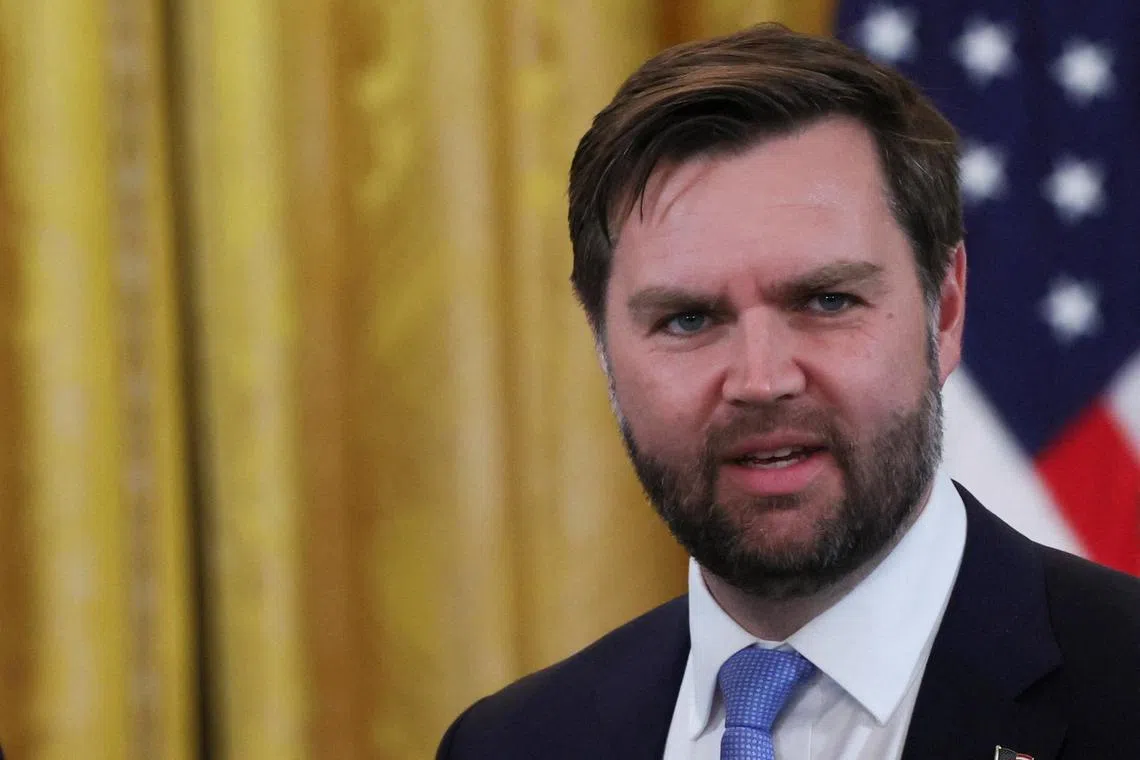Top Trump officials head to Europe for security talks
Sign up now: Get ST's newsletters delivered to your inbox

Vice-President J.D. Vance will take part in an AI summit in France and then attend the Munich Security Conference in Germany.
PHOTO: REUTERS
WASHINGTON - A trio of top Trump administration officials will make separate trips to Europe this week, with security and Washington’s commitment to Ukraine expected to be at the heart of their discussions.
President Donald Trump – pushing his “America First” agenda – has questioned US security commitments in Europe and called on allies to drastically boost their defence spending, while his administration has been largely quiet so far on his plans for future Ukraine aid.
Washington gave Kyiv tens of billions of dollars in military assistance under former president Joe Biden, but Mr Trump’s administration has yet to provide additional aid despite several billion dollars in remaining authority carrying over from his predecessor’s time in office.
Vice-President J.D. Vance will take part in an artificial intelligence summit in France and then attend the Munich Security Conference in Germany along with Secretary of State Marco Rubio, who will subsequently travel to the Middle East.
“The Vice-President will deliver remarks at each event and will hold bilateral meetings with world leaders,” according to the White House.
Pentagon chief Pete Hegseth will meanwhile visit the headquarters of two US military commands in Germany before attending a meeting of Nato defence ministers and a gathering of Ukraine’s international supporters in Belgium, then travel to Poland for talks with its leaders.
Mr Rubio – who was a regular at the Munich conference in his previous role as a US senator – has already travelled to Latin America as Secretary of State, but the trips this week will be Mr Vance’s and Mr Hegseth’s debuts on the international stage in their new roles.
In a sign of the new administration’s priorities, Mr Hegseth’s first trip as defence secretary was to the southern US border, where Mr Trump declared a national emergency on his first day in office.
Seeking ‘increased European leadership’
In Brussels, Mr Hegseth “will engage with Nato allies and partners to discuss the need to boost allied defence spending, increase European leadership, and expand defence industrial base capacity on both sides of the Atlantic”, the Pentagon said.
At the meeting of the Ukraine Defence Contact Group – which will be chaired by the UK instead of the US for the first time – Mr Hegseth “will reiterate President Trump’s commitment for a diplomatic end to the war in Ukraine as quickly as possible”, according to the Pentagon.
“He will also highlight the need for increased European leadership on security assistance to Ukraine.”
Mr Trump has repeatedly criticised US assistance for Kyiv and claimed before taking office that he could secure a ceasefire within hours – a result that has yet to materialise
His comments triggered fears in Ukraine and elsewhere in Europe about the future of US aid, and Kyiv’s ability to withstand Russian attacks in the absence of further American support.
Mr Trump has also rocked some of Washington’s closest partners by announcing tariffs against fellow Nato member Canada – which were later paused – and threatening to do the same to the European Union.
The targeting of US allies has further undermined confidence in America’s commitment after Mr Trump already cast doubt on his willingness to help protect Europe. The US President has also menaced Nato member Denmark by vowing to take control of its territory Greenland.
Mr Hegseth said in remarks to Pentagon employees on Feb 7 that part of “America First” is empowering US allies and partners “to be combat multipliers, to add to the capabilities that we have”.
But he also emphasised that Washington wants other countries to take on greater burdens: “America can’t be the guarantor of everything forever,” he said. AFP


